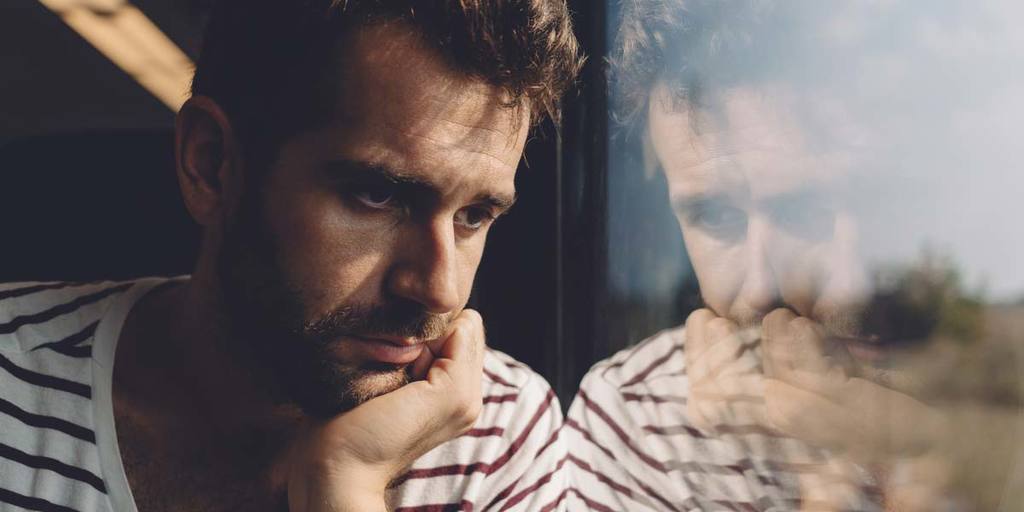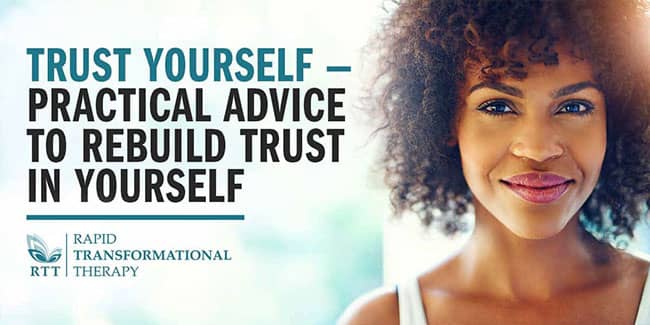Trust is one of the foundations of your relationship with your close friends and family.
Guess what?
It is also one of the foundations of your relationship with yourself.
Trusting yourself means that you are confident in what you want and in the choices you make.
If you find yourself hesitant, unable to make your own decisions, or constantly doubting your choices, you might want to learn to trust yourself more.
If you feel that you have difficulty trusting yourself, don’t worry; we’ve got you covered. There is a way to turn this around.
By reading this article, you will learn all the things you need to know to begin trusting yourself.
You will discover:
- What it means to trust yourself
- Signs to look for when you don’t trust yourself
- How lacking trust in yourself affects your life
- Reasons you lack trust in yourself
- How to learn to trust yourself more
What Trusting Yourself Means

When you trust yourself, you can count on yourself in any situation.
It means that you can commit to your growth; you know what you want, and you are confident in your capabilities to achieve.
That is not to say that you expect perfection. Even as a confident self-trusting person, you can sometimes expect to make a bad call as we all do.
Trusting yourself is not about making the right choice 100% of the time; rather, it’s about believing in yourself to bounce back even after making a poor choice.
Part of self-trust is to accept yourself—with all the good as well as the flaws.
What happens when you trust yourself?
Here is how you would feel if you trust yourself:
1. You are self-aware
You know what is important to you and the things you cannot tolerate. It’s easy for you to make your own choices, and you live authentically.
2. You are confident
When you are confident, it is much easier to decide what suits you and what doesn’t and move forward with that choice.
3. You take criticism well
You don’t take people’s criticism personally as they are assessing matters from their perspective. Like Marisa Peer, a world-leading therapist, says, “Once you believe in yourself it doesn’t really matter what other people think.”
Signs That You Don’t Trust Yourself
So, what does a lack of trust in yourself look like?
To help you know if it’s time to learn to trust yourself more, check and see if the following signs apply to you:
1. You hesitate in making decisions
Making any decision, big or small, takes a lot of time and effort. You keep swinging back and forth between your options, not sure which way to go.
You are doubtful that you are making the right choice so you spend hours, days, or even months on research before making a decision.
To end the misery, you usually resort to friends or family, ask for their opinions, and constantly feel the need for reassurance.
2. You rethink your choices
After finally settling on a choice, you still don’t feel certain. You keep rethinking your decisions even after making them. More often than not you find yourself frequently examining and reexamining your other options.
You wonder if the option you gave up was the better way to go.
3. You have a critical inner voice
Your inner critic is the voice in your head that criticizes your choices and actions. This voice is usually very harsh and judgemental and it causes you emotional pain and distress.
When you are your worst critic, you tend to beat yourself up for mistakes that you did and find it hard to forgive yourself no matter how small your mistake was.
Your inner critic voice tells you things like, “You don’t know what you are doing” or “If you say this now, they will find out just how dumb you are.”
Such overly critical dialogue with yourself eventually prevents you from pursuing what you want.
When you are with friends or a group of people, you tend to hold off from sharing your opinions. You refrain from participating in a conversation and avoid attention.
You feel like you might not be able to support your point of view or fear that what you will say may make you look incompetent.
4. You are not comfortable speaking your mind
If you are experiencing these signs, it’s important to understand how they can affect the quality of your life.
What Happens When You Don’t Trust Yourself

A lack of self-trust can have a negative effect on your life, from living in stress and unease most of the time to missing on growth opportunities. Sadly, if you don’t address the matter, it can get worse with time.
Here are some of the adverse effects you might encounter if you don’t learn to trust yourself more.
1. You self-sabotage
Self-sabotage can take many forms and affect many aspects of your life, like your career and personal relationships.
You might be self-sabotaging and hurting your personal growth by taking actions that do not serve your best interest. Sometimes self-sabotage can present itself in failing to take necessary steps.
For example, you may be delaying emails, tasks, or reports at work because you are not confident of your work. You keep second-guessing everything you do.
Your delays might be affecting the work process and eventually, you get negative feedback on your job evaluations.
Another example that can happen in your personal life is not speaking up when you are not happy in your relationship with your partner.
You could be tolerating traits or behaviors that bother you because you are hesitant about discussing the matter with them. After some time, this could lead to you growing apart and ending the relationship.
2. You experience negative emotions
When you lack trust in yourself, you frequently face situations that get you stressed and anxious. That’s because you are constantly thinking and assessing matters under the pressure of your critical inner voice.
You could also be feeling down if you are blaming yourself for an unfavorable outcome of a decision you have made.
Consequently, this emotional turmoil can negatively affect your health and the quality of your life in the long-run.
3. You live somebody else’s life
When you base many if not all of your decisions on your friends’ advice, you are not living your own life.
No matter how well your friends or family may know you, they don’t know you better than you will ever know yourself.
Following people’s advice all the time will only push you further away from knowing and trusting yourself.
The Biggest Reasons Why You Don’t Trust Yourself

To work on trusting yourself more, it’s important to understand what causes your lack of self-trust.
Here are the two main reasons why people don’t trust themselves.
1. You are judging yourself because of your failures
Trust is built cumulatively based on the moments, events, or situations where you proved to yourself that you are worthy of your own trust.
In the same way, when you repeatedly fail to keep your promises, you disappoint yourself and lose trust in yourself.
For example, imagine you decide to be healthier and become fit. However, every time you buy a gym membership, you gradually stop going to the gym after a week or two.
The next time you consider getting a gym membership, you will doubt if you can trust yourself to commit to it, right?
Your mind is constantly recording your behaviors. When such disappointments become frequent, you form negative ideas or a belief about yourself.
For example “I’m not reliable” or “I am not the type of person who can commit to exercising.”
2. You have low self-esteem
You might have been harshly criticized for your choices growing up, which led you to have low self-esteem.
It could be that your parents didn’t allow you to make your own decisions to protect you from making mistakes; or questioned your choices, doubting that you are making the right ones.
As children, we are much more sensitive and prone to emotional hurt.
For that reason, you could have internalized this feeling of incompetence. You adopted the criticism and accepted it as a part of who you are.
From her 30 years of experience with clients from all over the world, Marisa Peer concluded that the common denominator for most of our fears and the cause of our setbacks is the feeling that we are not enough.
You might have lost trust in yourself after many disappointments or you grew up thinking and believing that you were not good enough because you were taught so.
In both cases, at some point, you decided to believe that you are not smart enough, not reliable enough, or maybe not lovable enough. This led you to lose trust in yourself.
You might be thinking now, “How do I undo this and start trusting in myself again?”
The good news is that you can practice self-confidence and reprogram your mind to trust yourself again.
How To Learn To Trust Yourself

So, how do you build trust in yourself?
To build self-trust, train yourself to be more confident like you train your muscles to become stronger.
Start with small steps and take it one day at a time. Use the tips and exercises listed below to start practicing being confident and trusting yourself.
Here are things you can do to learn to trust yourself:
1. Choose the people you surround yourself with
Stay away from people who usually make destructive comments and those who are overpowering in conversations.
Instead, surround yourself with people who believe in you and are supportive of you. This should help you speak your mind and participate in conversations with more ease.
2. Give yourself small tasks
Completing tasks no matter how small will help you regain trust in yourself. Pick a new habit that you want to adopt, start doing it, and track yourself. Choosing a simple task will make it easier to integrate into your daily routine.
Completing the task and committing to a new habit will give you a sense of accomplishment and boost your confidence.
For example, you could choose to drink a glass of water first thing when you wake up every day.
Remember, it is okay to fall off the wagon sometimes. That is normal. The most important thing is to pull yourself back on track. So if you missed a day, just go back to it the next morning.
3. Focus on your strengths
Doing more of what you’re good at helps boost your confidence and trust in yourself.
List the things that you are good at. You can ask a close friend to help you identify your strengths. Then, plan to use one of your strengths now, whether in your job or your personal life.
For example, if you are a great photographer and you enjoy taking pictures of your city. Take it on as your hobby and practice it in your free time.
If you already do, take it a step further and plan to participate in an exhibition or take an advanced photography course.
4. Make your own decisions by dropping perfectionism
Push through the hesitation and make a choice.
Remind yourself that often there are no good or bad options, there are just different options. Even if the outcomes were not preferable, you would learn from them and know to do better the next time.
Focus on progress, not perfection.
Start small. For example, the next time you are out for lunch and feel like trying a new dish on the menu, but you’re feeling hesitant and unsure, go for it.
What is the worst that will happen? If you like it then add it to your list of favorites and if you don’t, now you know not to order it again.
What is more important is that you explored something new today.
This is a small example, but it is a starting point. Gradually, you will be more confident about making bigger and more important decisions.
5. Change your self-talk

According to Marisa Peer, even though people’s criticism can be destructive, it is far more destructive when you criticize yourself.
“Don’t be your own worst critic, be your own best friend.”—Marisa Peer
Instead of beating yourself up, replace that with positive affirmations. Just like you would be your friend’s cheerleader, be your cheerleader.
When you repeat a positive affirmation, you are reprogramming your mind to accept your new beliefs—the beliefs you choose.
So, choose phrases such as “I am enough,” “I am confident,” or “I am competent” as your daily affirmation and say it to yourself repeatedly during the day.
Integrate these words in your day by adding them to your daily routines. For example, you could write it on a post-it note on your mirror so you can see it and repeat it every morning while getting ready for the day.
6. Get to the root cause of the problem
As we explained in the previous section, the reasons for your lack of self-confidence come down to a negative belief that you adopted at some point in time.
To learn to trust yourself again, it is imperative that you change this belief.
Now you might think, “But changing a belief doesn’t sound like an easy task to do.”
You are right, it can take a long time and a lot of work to change your beliefs because more often than not they are deeply rooted in your subconscious—at the back of your mind where you are not aware of them.
What if we told you that there is a way to get to the root of your beliefs and change them into the positive, empowering beliefs you want?
That is exactly the purpose of the cutting-edge, award-winning program I Am Enough.
Known for her love for practicality and speedy results, Marisa designed the I Am Enough program to help you access your subconscious mind and build an unshakable positive belief system.
The I Am Enough program uses the most powerful tools from different therapeutic modalities such as cognitive behavioral therapy, Neuro-Linguistic Programming, and includes eight recorded self-hypnosis root cause sessions. These recordings will take you back in time to when the idea was first planted in your mind and help you replace it.
During the program, you will work on building self-esteem and confidence as one of the program’s aims is to help you gain complete confidence in yourself and empower you to shape your life and your world in the way you love.
If you want to get a feel of how it works, you can check out Marisa’s free ‘I Am Enough’ masterclass and experience it for yourself.
So next time you’re facing a confusing decision, or you think you made a mistake, don’t beat yourself up about it.
Remember, the sweet would never be as sweet without the sour. Experience everything that life has to offer.



